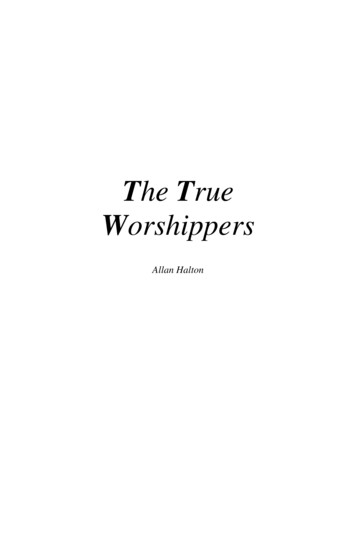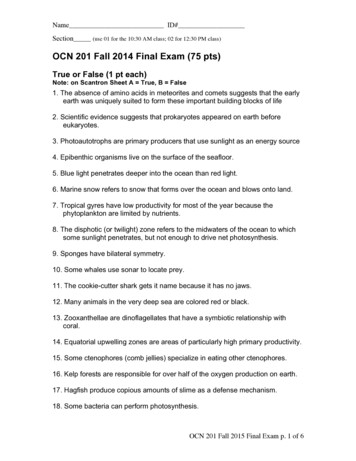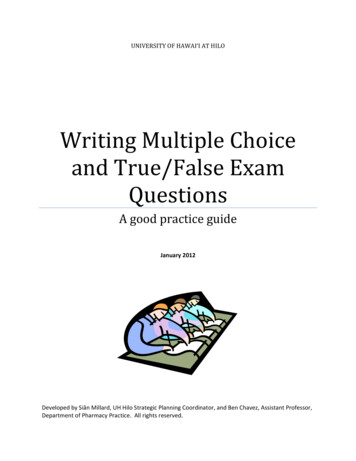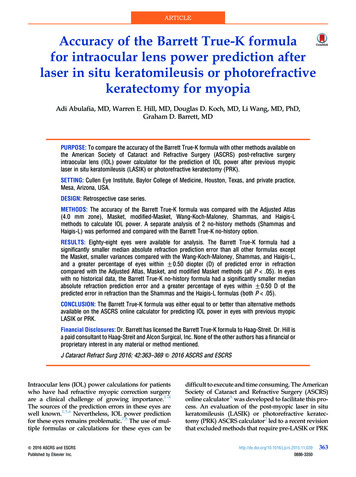
Transcription
The TrueWorshippersAllan Halton
2
The True WorshippersBut the hour cometh,and now is,when the true worshippersshall worship the Fatherin spirit and in truth:for the Father seeketh suchto worship Him.John 4:233
This book is published without copyright. Anyone who desires touse parts of it for the propagation of the Gospel and the edifyingof the body of Christ is free to do so.Allan Halton, September 2016ISBN-13: 978-1535254014ISBN-10: 1535254017All Scripture references are from the King James Version unlessotherwise indicated.Please note also that LORD (capitalized) in the KJV meansJehovah (Yahweh).4
Intertwined in this writing are the insights of many othersthat have lodged in my heart over the years, so that Iscarcely know what to take credit for myself—except its shortcomings.To God be the glory for all else.5
Table of ContentsChapter One:The Father Seeks True WorshippersPage 9Just what is worship?Worship and serveWorship and sacrificeAbel’s offeringThe acceptable sacrifice1522242629Chapter Two:The Realm Of The TruePage 35Neither in this mountainNor yet at JerusalemGrace and truthThe true tabernacleThe true breadThe true vineThe true light35374042444651Chapter Three:The Realm Of The SpiritPage 61Not type or shadow but the very imageSpiritual reality6771Chapter Four:The True CircumcisionPage 75Return—to go forwardAbrahamIsaacJacob828687936
JudahTo the Jew firstThe offence of the CrossMessianic?The Jews’ languageThe land9899101105108116Chapter Five:Worship In The Holy Of holiesPage 125The provision of the holiest of allA heavenly praise and worship serviceWhat happened to the veil?132140143Chapter Six:Worship In The Idol’s TemplePage 149The idols of the heart157Covetousness, which is idolatry160A matter of life and death164The golden calf169They worship the works of their own hands 170“Little children, keep yourselves from idols” 177Chapter Seven:The True WorshippersPage 183Chapter Eight:The Liturgy Of Eternal LifePage 197A more excellent liturgyThe liturgy of the windThe new creation man—a true worshipperA new dimension of worship and ministryThe liturgy of the fountains of waterAbraham’s and Isaac’s worship service1982002052082122187
8
Chapter OneThe Father Seeks True WorshippersIt is a beautiful and much loved passage ofScripture, the account of a divine coincidence—aSamaritan woman going about the routine of daily lifemeeting a certain Man at an ancient well. It was a meetingthe woman was not expecting, yet God had planned. As weread between the lines we sense that this woman had longbeen seeking fulfillment, only to find herself after manytroubled years still empty. This meeting filled the longingache of her heart, and changed the course of her life.For, she discovered that God Himself is a seeker.This is what Jesus the Son of God revealed to her atthe well of Samaria. He and His disciples had stopped atthis well on their way back to Galilee. They had alreadycome a long way; they were weary and hungry and thirsty,and they stopped around noon for a rest at the well justoutside the city of Sychar (the ancient Shechem). Jesus’disciples went into the town to buy some lunch, and He,awaiting their return, sat on the well.9
Let’s read the passage.There cometh a woman of Samaria to drawwater: Jesus saith unto her, Give me to drink.(For his disciples were gone away unto thecity to buy meat [food].)Then saith the woman of Samaria unto him,How is it that thou, being a Jew, askest drink of me,which am a woman of Samaria? for the Jews haveno dealings with the Samaritans.Jesus answered and said unto her, If thouknewest the gift of God, and who it is that saith tothee, Give me to drink; thou wouldest have asked ofhim, and he would have given thee living water.The woman saith unto him, Sir, thou hastnothing to draw with, and the well is deep: fromwhence then hast thou that living water?Art thou greater than our father Jacob, whichgave us the well, and drank thereof himself, and hischildren, and his cattle?Jesus answered and said unto her,Whosoever drinketh of this water shall thirst again:But whosoever drinketh of the water that Ishall give him shall never thirst; but the water that Ishall give him shall be in him a well of waterspringing up into everlasting life.The woman saith unto him, Sir, give me thiswater, that I thirst not, neither come hither to draw.Jesus saith unto her, Go, call thy husband,and come hither.The woman answered and said, I have nohusband. Jesus said unto her, Thou hast well said, Ihave no husband:For thou hast had five husbands; and hewhom thou now hast is not thy husband: in thatsaidst thou truly.10
The woman saith unto him, Sir, I perceivethat thou art a prophet.Our fathers worshipped in this mountain;and ye [that is, ye Jews] say, that in Jerusalem is theplace where men ought to worship.Jesus saith unto her, Woman [which wasakin to saying, Madam], believe me, the hourcometh, when ye shall neither in this mountain, noryet at Jerusalem, worship the Father.Ye worship ye know not what: we knowwhat we worship: for salvation is of the Jews.But the hour cometh, and now is, when thetrue worshippers shall worship the Father in spiritand in truth: for the Father seeketh such to worshiphim.God is a Spirit: and they that worship himmust worship him in spirit and in truth.The woman saith unto him, I know that Messiascometh, which is called Christ: when he is come, hewill tell us all things.Jesus saith unto her, I that speak unto theeam he.(Jn. 4:1-26)Before we go on, let me quickly take a moment tospeak of gender specific language. John records Jesus’conversation with a woman, writing that Jesus says, “thewater that I shall give him. shall be in him.” This isgender inclusive language, not gender specific language, asalso in countless other places in Scripture. For example,when Paul says those led by the Spirit of God are sons ofGod, he is including women as well as men. I do trust thatall who read the Bible understand this grace, which I followin this writing as well.11
And so, God—we take note that Jesus calls Him theFather—He is a seeker. There is great emphasis inScripture on seeking God; this is very important. We are tobe seekers. But, God Himself a seeker? Surely this must layhold of us. Our own seeking is not going to get us very farif it is not in line with what He Himself is seeking.What is He seeking, then? Jesus says the Father isseeking true worshippers. You mean He wants to teach ushow to really get into it on Sunday morning when the“worship team” leads us in worship? Or maybe He wants tocounsel us where to worship? Christians sometimes ask oneanother, “Where do you worship?” They want to knowwhat church you attend. Does that define worship, then,and set its boundaries—where people go to church andwhat they do in church on a Sunday morning?Or, serving God. A little further on in this writingwe will see how closely worshipping and serving God arelinked. This becomes a powerful pursuit for many who turnto Christ. They don’t want to waste their precious momentof mortal life serving themselves anymore; now they wantto serve God. I knew such a young man myself long ago.He had wasted his youth seeking after all the things theGentiles seek. Now he wanted to serve God, and there wasno time to lose. He was thinking in terms of what has beencalled the “five-fold” ministry of the church—apostles,prophets, evangelists, pastors and teachers. This, of course,might be God’s will for certain ones, those He calls to this.But it is not His ultimate calling—even for them. Ina message I listened to recently the speaker said somethinglike this: “If God is grooming you for a very high calling,then know that He will first take you into the depths.” Thatis true, yet it saddened me that the man was speaking interms of the apostolic calling. I wondered how many in his12
audience might have felt left out, that they had not been“marked out for a very high calling.” Yet Paul, himself acalled apostle, wrote that he was giving his all in order to“press toward the mark for the prize of the high calling ofGod in Christ Jesus” (Phil. 3:14). This ought to cause thosewho have been called to the ministry to search their hearts,and it ought to encourage also those who are not called tothis. For, God’s ultimate call for one and all is, simply, tobecome true worshippers. The Son of God says that this iswhat the Father is seeking. True worshippers.You mean this is all He wants? All He is seeking?Yes. All. If that seems kind of a letdown to us, it’s onlybecause we have not yet discovered how utterlybreathtaking this is—being one of the Father’s trueworshippers. It is something they are more than somethingthey do. Oh, for vision, then: open our eyes, Father. For,once we discover what becoming a true worshipper is allabout, we will lose interest in our own ideas of somethingfulfilling for our lives.“But the hour cometh, and now is, when thetrue worshippers shall worship the Father in spiritand in truth: for the Father seeketh such to worshipHim.”This is what, or should I say, who, the Father isseeking. True worshippers. We must ask the searchingquestion, then, and it will take some courage. In all theactivity that falls under what we know as church—all theministry, all the preaching and teaching, all the outreaches,all the Bible studies, all the programs. all the activity wehave come to consider church. is Father finding what Heis seeking? If He is seeking true worshippers, is He findingthem? Let’s bring that closer to home. Am I one of them?Am I at least becoming one of them? Hopefully this13
question causes me to pause, and then stop, and check mybearings. lest somewhere down the road I discover to mygreat sorrow that what I was seeking and what God wasseeking were two different things, and I have arrived at adestination far from where God, if He had been given Hisway, would have led me.The encouraging thing is that in asking thissearching question—and asking God Himself to search ourhearts about it so we may know for sure if He is or is notfinding what He is seeking in our lives—we are right therebecoming engaged in the Father’s own seeking. He isseeking true worshippers, and as we respond with an openand honest heart, a heart that is willing to give Him thedesire of His heart, we are right there beginning to enterinto the true worship He has in mind. We are totallyhelpless to come to this on our own. We would have noidea what steps to walk in to get to this destination, muchless know what the destination actually looks like. Butsince God Himself is seeking this in our lives, we havemuch assurance. If we are truly desirous of becoming oneof these true worshippers of His, He will see to it that weare not disappointed. He will not disappoint the desire ofHis own heart.Jesus defines the true worshippers as those whoworship the Father in spirit and in truth. What is this allabout, then? We want to look at this, and hopefullydiscover in some measure, with His help, what He meansby this. For, it is a beautiful discovery in our walk withGod—the day we begin to see that, whatever our lot in thisearthly life, the greatest of all fulfillments is ours in simplybecoming one who worships the Father in spirit and intruth. This is all God is really after in our lives. There isnothing greater, nothing higher, nothing more fulfilling thatwe could possibly hope for, or attain to, than becoming a14
true worshipper. Coming to this, we have arrived at thedestination of the walk of the disciple of Christ—only todiscover that this destination is actually an eternal Way—and the deepest desire of God’s own heart. In fact there is arealm of worship that, as far as finding fulfillment isconcerned, is exceedingly abundantly above anything wecould ever ask for. or even think.We think of worship as something we do onSundays for an hour or so—the worship service. Ourconcept of worship must be enlarged. We think of ministry,of serving God, as something the man behind the pulpit isinvolved in. Our concept of ministry must be enlarged.There is a ministry beyond ministry: I mean beyondministry as we are accustomed to think of it. In fact, whenthe ministries God has set in the church become an end inthemselves and not a means by which the people of Godare equipped to give Him the desire of His heart, thoseministries have failed God’s purpose for them.And so, let us examine this. What does it mean tobe one who worships the Father in spirit and in truth?What is a true worshipper?But let us ask first:Just what is worship?We are accustomed in our day to find the wordlinked with the word praise. The churches have a time ofwhat they call praise and worship: a time when the worshipteam leads in singing and praising and lifting up the handsand worshipping during the Sunday service before themessage is delivered. But, according to our Bible, is that15
what worship is? This might be a part of it. But let’s becareful we don’t put the part for the whole.The first worship leader mentioned in the Bible isAbraham. At least the first mention of the word worship inScripture is found in the Genesis story of Abraham. Andjust how is this worship leader called to worship? It’s witha sacrifice. God has called Abraham to offer up Isaac “uponone of the mountains which I will tell thee of” (Gen. 22:2).He and Isaac head out together to the land of Moriah withtwo of Abraham’s servants and an ass laden with wood. Onthe third day Abraham lifts up his eyes and sees the placeafar off. Now he lays the wood on Isaac’s shoulders(obviously Isaac is a strong young man by this time) andtakes the fire in his own hand, and the knife, and leaves theservants behind.“I and the lad will go yonder and worship,and come again to you” (Gen. 22:5).After these words we are given the Genesis accountof Abraham and Isaac’s worship service on Mount Moriah.It involved a sacrifice.In Hebrew, the word worship actually appearsearlier in Genesis but is not translated worship. This iswhen the LORD (Jehovah) with two angels appeared toAbraham and proclaimed that the time was at hand for thebirth of the long-promised heir.“And he lifted up his eyes and looked, andlo, three men stood by him: and when he saw them,he ran to meet them from the tent door, and bowedhimself toward the ground” (Gen. 18:2).16
Bowed is the Hebrew root shachah, the same wordtranslated worship in Gen. 22:5. It is often translatedworship or bow down. We find the same word several timeswhen Abraham’s servant began to realize the Lord hadprospered his commission to find a bride for Isaac:“And the man bowed down his head, andworshipped the LORD” (Gen. 24:26).“And I bowed down my head, andworshipped the LORD” (Gen. 24:48).“And it came to pass, that when Abraham’sservant heard their words, he worshipped theLORD, (bowing himself) to the ground” Gen.24:52).The words bowing himself in this last verse areitalicized in the King James Version, meaning that they arenot actually there in the original. However, with thesewords the KJV gives the true sense of the word shachah: tobow down. The American Standard Version gives the moreaccurate translation:“And it came to pass, that, when Abraham’sservant heard their words, he bowed himself downto the earth unto Jehovah.”The act was the servant’s acknowledgement that itwas God who had put this all together; he had just beenserving Him. Worship, then, is this acknowledgement; itimplies submission and obedience to the one who is beingbowed to or worshipped. The same word is translatedobeisance where Joseph told his brethren that in his dream,his sheaf stood upright, and their sheaves “made obeisance”to his sheaf (Gen. 37:7). According to my dictionary17
obeisance comes from the old French word obeissance. Weget our English word obedience from it. To worship, then,means acknowledging, bowing down to, a greater authority,with readiness to obey.“O come, let us worship and bow down: letus kneel before the LORD our maker” (Ps. 95:6).And in The Revelation, the twenty-four elders falldown and worship Him who liveth forever and ever (Rev.5:10)The first use of the word worship in the NewTestament occurs when the wise men ask Herod where theycan find the newborn king of the Jews.“For we have seen His star in the east, andare come to worship Him” (Gen. 2:2).This is the Greek word proskuneo and it means tokiss toward, from pros, toward, and kuneo, to kiss. Thisalso reflects submission and obedience. In Psalm 2, implicitin “Kiss the Son” is kissing His feet: that is, bowing beforeHim in complete acquiescence and submission.We find proskuneo in Hebrews 11:21 where weread that Jacob “worshipped (proskuneo) leaning upon thetop of his staff.” Here’s something very interesting aboutthis. (I’m not going off on a tangent; it’s here because. butwait, you’ll see later on why it’s here.) The writer ofHebrews is quoting here from the Septuagint translation ofGen. 47:31. The Septuagint translators, who translated theHebrew scriptures into Koine Greek in the third centuryBC, chose proskuneo for the Hebrew shachah. The KingJames Version, translated directly from the Hebrew, has,“And Israel bowed himself (Heb. shachah) upon the bed’s18
head.” So, here we have a discrepancy. One says, “the topof his staff,” the other, “upon the bed’s head.” It’s because,since written Hebrew was a language of consonants withoutvowels, the same Hebrew consonants, something like ourEnglish m t and h, spelled either staff or bed, the contextdetermining which was correct. For example, if in Englishall we had was bd, we would not know if bad or bed or bidor bud were meant without the context. And so, since it wasnot till around the ninth century AD that the Masoretetranslators of the Hebrew scriptures invented vowelpointing, the Septuagint translators in 250 BC orthereabouts, with no vowel pointing to guide them, and nodoubt having in mind the crippling that transformed Jacobto Israel, considered the meaning of the Hebrew at Genesis47:31 likely (and I think rightly) to be staff. For, afterPeniel, Israel walked all his days leaning on his staff.It is proskuneo in its noun form—proskuneetees—that we find in “the true worshippers.”And so, just elementally, that’s what worship is. Itis a state of total submission and obedience and surrenderto God, a recognition that God is to be acknowledged asGod, and obeyed simply because He is God. WhetherHis dealings with us are good and pleasant, or hard andpainful, whether they are understood or not understood,nevertheless He is to be worshipped. He is, after all, God.Satan moved God to destroy Job “without cause”(Job 2:3). We are left with our mouth open when we readof the evils that suddenly befell him. Yet after it all—andour mouth is open wider at this—“Job arose, and rent hismantle, and shaved his head, and fell down upon theground, and worshipped.” He worshipped God not onlywhen his life was full and blessed, but also when his wholeworld around him had totally collapsed. Why?19
Simply because God is God. God. is God.I think also of David, and the collapse of his wholeworld when he fell into the snare of the Devil andcommitted adultery with Bathsheba, and then conspired tohave her husband murdered so he could legally marry herand hide his sin. This is the same man who slew the giant?The same sweet psalmist of Israel, pure of heart, tender ofconscience, beloved of the Lord? Now he himself isbrought down by a giant that has slain many strong men(Pr. 7:26). The psalms David wrote during this time showthe torment he went through day and night till finally Godlanced his wounded conscience with the piercing word ofNathan the prophet.“Thou art the man.”Finally the poison bursts out; David confesses hissin.“I have sinned against the LORD.”This is what broke David’s heart more thananything—the breach he had caused in the lovingfellowship he shared with his God. And it was no lightthing for David to make this confession; he made itknowing the penalty for his sin (Dt. 22:22). Nathanresponded:“The LORD hath put away thy sin, thoushalt not die.”David would no doubt have preferred to die and puthimself out of his misery. But that was not his God’s willfor him: he was not to die. Down the corridor of time20
Another would die instead of him, and “put away sin by thesacrifice of Himself.”And so David, after lying on his face and fasting tillthe son born of this sin died when he perceived that hehad died, he “arose from the earth, and washed, andanointed himself, and came into the house of the LORD,and worshipped ” (2 Sam. 12:20).What a hypocrite, right?No, this was a deeply broken man prostratinghimself before his God in contrite heartfelt worship. Davidreceived by faith God’s atoning sacrifice to come, and wentinto the house of the LORD, and worshipped. Only a Godlike his God could reach down like this and deliver hislamb from the very jaws of the lion of Death. And so heworships Him. Cleansed by faith from his sin and hisguilt—and I think it likely that it was during this time thathe penned the prophetic words of Psalm 32—he moves onnow, recognizing and accepting again that his life is not hisown. His life is totally in the hands of his God to do with asHe wills. If He has delivered him from Death, if He hasfurther purpose for him so be it. Amen. Contrite andbroken of heart, He bows before Him. He will continue topresent himself a sacrifice before his God, that His purposein his life—that of “serving God in his generation”—mightbe fulfilled which apart from God’s mercy and gracewould have ended in complete miscarriage.Let us learn a lesson from this worshipper, David.When there has been failure in our own lives let us not feedmorbidly on the failure. We are bought with a Price; ourlives are not our own, just as David’s life was not his own.The call of God was on his life; others needed him. So withus. Let us receive our Lord’s gracious provision for failure,21
for sin (1 Jn. 2:1,2). Let us worship Him thus, and move onfor His sake.Worship and serveIt is interesting and revealing to note how the wordserve is consistently linked together with the word worship.In the very terms of the Sinai covenant, Jehovah said ofother gods, “Thou shalt not bow down thyself to them, norserve them” (Ex. 20:5). The children of Israel were to beexclusively His own people, “with whom the LORD hadmade a covenant, and charged them, saying, ‘Ye shall notfear other gods, nor bow yourselves to them, nor servethem, nor sacrifice to them ’” (2 Ki. 17:35).The word serve here is the Hebrew word gavohdah.It’s the same word that is used of bondslaves. The Israeliteswere to worship and serve Jehovah as His bondslaves; theywere not to be the bondslaves of men or idols.Under the old covenant, the ministry of the Leviteswas called their service, which is the same Hebrew wordgavohdah. The Levites were to serve the Lord in all thingspertaining to the tabernacle. Just as there were in the worldbondslaves to men or idols, the Levites were God’sbondslaves, serving Him in all things relative to thetabernacle and the offerings. This was their service.Coming into the New Testament, we read that whenJesus was tempted by the Devil to “fall down and worshipme” (note the posture), He rebuked him saying, “Get theehence, Satan: for it is written, Thou shalt worship the Lordthy God, and Him only shalt thou serve” (Mt. 4:10).22
And Paul said man in his downward spiral ofapostasy “worshipped and served the creature more thanthe Creator who is blessed forever” (Rom. 1:25).The word serve used in both of these NewTestament passages is the Greek latreuo, which Vinedefines as religious service or homage. We’re familiar withthe word but maybe don’t recognize it in our English wordidolatry, which is the worship and service of idols. Idollatreia.We find the word latreuo in other places in theNew Testament that show it expresses religious service:“ Present your bodies a living sacrifice,holy, acceptable unto God, which is your reasonableservice” (Rom. 12:1).Paul is making a comparison here between theservice of the Levites in the offering and sacrifice ofanimals, and the “spiritual service” (ASV) of the NewCovenant in which we offer “spiritual sacrifices acceptableto God by Jesus Christ” (1 Pt. 2:10).It’s the same type of service but on differentplanes—the one a type, the other the fulfillment of thattype.The writer of Hebrews explains that those who offergifts and sacrifices according to the Law “serve (latreuo)unto the example and shadow of heavenly things ” (Heb.8:4). And he says that those sacrifices “could not make himthat did the service perfect as pertaining to theconscience ” (Heb. 9:9). The word is actually translatedworship a little further on when he says that these offeringscould never make those who draw nigh to God perfect.23
“For then would they not have ceased to beoffered? For the worshippers once purged shouldhave had no more conscience of sins” (Heb. 10:2).Again, it’s the word latreuo that’s used here. It isthis word that Paul uses when he says before Felix:“But this I confess unto thee, that after theWay which they call heresy so worship I the God ofmy fathers ” (Acts 24:14).And so, worship and serve these two areintimately linked together, as we shall see more fully laterin this writing.Worship and sacrificeWorship and sacrifice are inextricably intertwined.The psalmist said:“Give unto the LORD the glory due untoHis Name: bring an offering, and come into Hiscourts.O worship the LORD in the beauty ofholiness” (Ps. 96:9).Bring an offering worship the LORD. Ouroffering is the expression of our worship. Yes, butultimately the offering we bring is the offering we havebecome, just as Isaac became the offering of Abraham’sworship. Abraham was worshipping—and Isaac, too.“I and the lad will go yonder andworship ”24
Isaiah prophesied of the day when God would sendemissaries to the nations:“ And they shall declare My glory amongthe Gentiles.And they shall bring all your brethren for anoffering unto the LORD out of all nations And it shall come to pass that from one newmoon to another, and from one sabbath to another,shall all flesh come to worship before Me, saith theLORD” (Isa. 66:19,20, 23).In what way do these Gentiles come to worship? Bybecoming an offering. No mention of animals here, but“your brethren.” That is quite the statement. This, then, isspeaking not of the old covenant, but of the new, acovenant for true worshippers in which Jews and Gentilesare now brethren.And, that is the true worship: we ourselvesbecoming an offering unto the Lord.Paul almost certainly had this passage from Isaiahin mind when he wrote to the Romans, telling them of thegrace of God given to him:“That I should be the [Gk. a] minister ofJesus Christ to the Gentiles, ministering the gospelof God, that the offering up [or, the sacrifice] of theGentiles might be acceptable, being sanctified bythe Holy Spirit” (Rom. 15:16).That was the whole purpose of Paul’s ministry (andought to be the whole purpose of all ministry). It is thewhole purpose of salvation, actually. We are saved notprimarily for our own sake, not merely so we can escape25
the fate of sinners and go to Heaven now, but that we maygive ourselves a living sacrifice to God. Paul’s ministrywas God centred, not man centred. His whole purpose wasto present to God an offering, a sacrifice—that is, toworship Him along with those who became that acceptableoffering.Abel’s offeringThe first act of worship we find in Scripture isAbel’s offering. Abel in an act of worshipping God offereda sacrifice.Let us clarify something before we go on. Peoplequestion derisively, what kind of God is this God who backthen called for all this offering and sacrifice? They wantnothing to do with so primitive a God. But that is veryprimitive thinking. Surely we recognize that it is no easything for the darkened mind of man to see the true reality ofthe things of God. Those ancient sacrifices were butrepresentations of spiritual reality. God led his creatureman step by step by step till in the fullness of His eternalpurpose He brought him out of the shadows and into thereality those shadows spoke of. Let us take our shoes offbefore the only-wise God. He implemented animal sacrificeas a simple lesson that spoke of a Sacrifice to come.But someone presses the question: why sacrifice inthe first place, why sacrifice at all? Let me counter again.Why death? That is the answer to the question, whysacrifice. Death is an enemy that, hard on the heels of Sin,entered into the family of man by an Enemy (Rom. 5:12).But God is the God who defeated that Enemy with his ownweapon. The Son of God, because He was a man, was26
appointed to death, for that is the sentence that was passedupon all men because of sin. He Himself was without sin,yet He died because of sin. His death was an offering inwhich He “bore the sin of the many” (Heb. 9:27, 28). Hisdeath was act of sacrifice, of worship—the greatest act ofworship the world has ever seen, or will see—that put aneverlasting end to Sin and Death, and the Enemy whopassed them along to man.It was with animal sacrifice that God began to showthis truth to his creature man. Every sacrifice God evercalled for was a prophecy in type of the eternal purpose thatHe accomplished in Christ Jesus the Lord—that ofovercoming in His sacrifice the sin and the death that Satanthe Serpent poisoned the family of Adam with, and ofbringing forth a new Man in a whole new dimension ofLife: new creation life, eternal life. the Resurrection andthe Life.And so Abel offered unto God “of the firstlings ofhis flock and of the fat thereof” (Gen. 4:4).“And the LORD had respect unto Abel andto his offering.”Cain also made an offering “of the fruit of theground.” But God rejected Cain and his offering. So Cainin jealousy rose up and slew his brother Abel.Thus, very early in the Bible we discover that theworship God calls for has a price tag on it. The worsh
been seeking fulfillment, only to find herself after many troubled years still empty. This meeting filled the longing ache of her heart, and changed the course of her life. For, she discovered that God Himself is a seeker. This is what Jesus the Son of God revealed to her at











